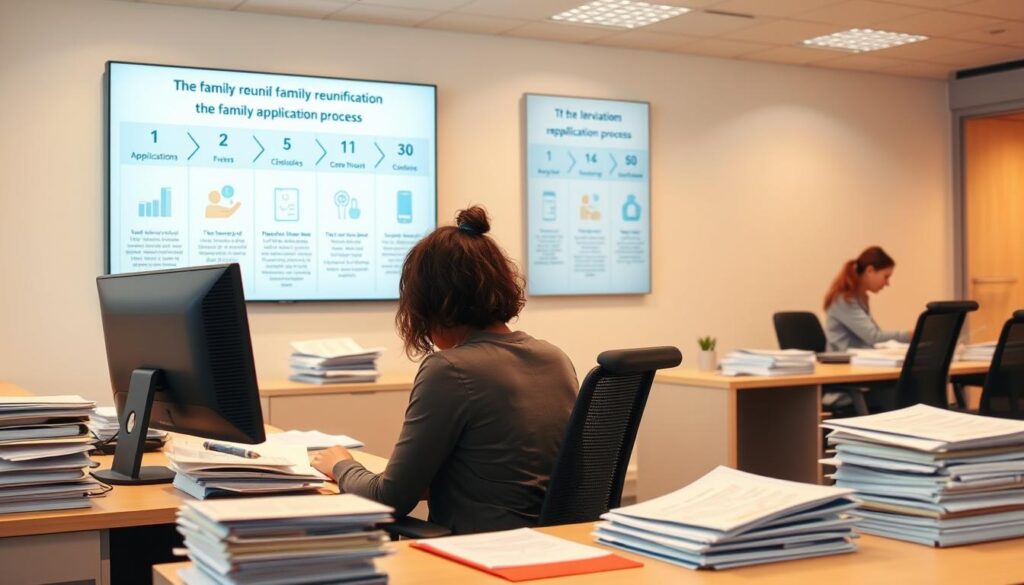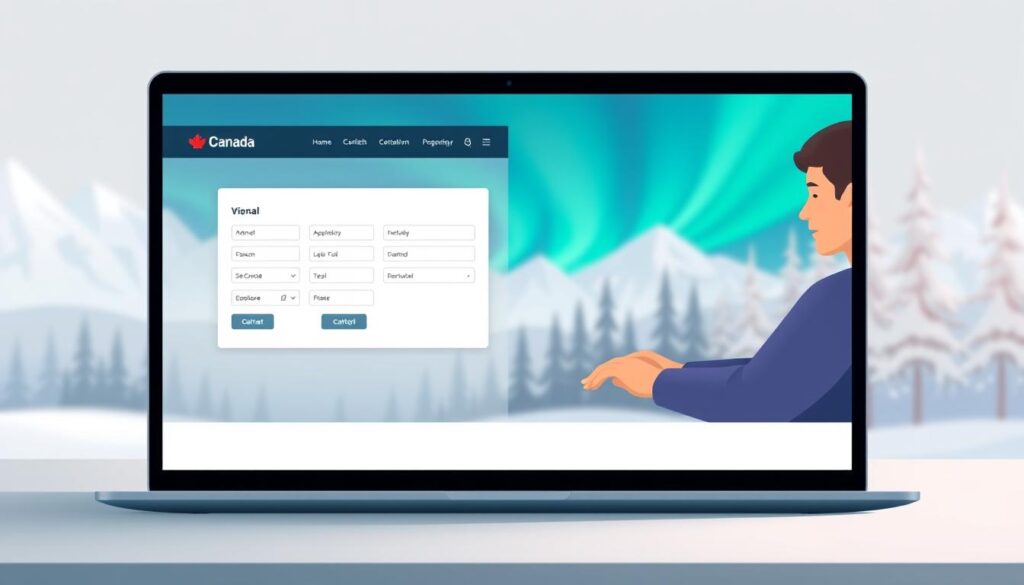Did you know Canada invited 35,700 applicants for the 2024 intake before closing the program on August 2? This popular pathway helps families reunite through the Permanent Residence Portal, but strict deadlines apply.
The Parent Grandparent Sponsorship Program allows eligible Canadians to sponsor their close relatives. However, the 2024 cycle is now closed, with IRCC targeting 20,500 approved applications.
To prepare for future intakes, ensure you meet requirements like proof of citizenship. Processing happens exclusively through the official immigration portal, so avoid delays by submitting accurate documents early.
Understanding Parent Grandparent Sponsorship
IRCC’s family sponsorship initiative strengthens bonds across generations. This program, governed by immigration law, allows citizens and permanent residents to submit a sponsorship application for eligible relatives. Unlike temporary visas, it grants permanent residence, fostering long-term stability.

How the Program Works
Administered by IRCC, this initiative requires a 20-year financial undertaking. Sponsors must prove income meets thresholds to prevent reliance on social assistance. Benefits include:
- Access to healthcare under provincial plans
- Legal residency for family members
- Multi-generational household support
Comparing Pathways
While the Super Visa offers extended visits, this program secures Canadian citizenship for loved ones. Review the differences below:
| Feature | PGP Program | Super Visa |
|---|---|---|
| Duration | Permanent | Up to 2 years per visit |
| Financial Proof | 3 years of income | 1 year of income |
| Healthcare | Provincial coverage | Private insurance required |
Ensure you meet all criteria before applying. Missing documents can delay processing.
Eligibility Requirements for Sponsors
Canada sets clear rules for those wishing to bring their loved ones permanently. You must prove financial stability, legal status, and residency to qualify. Missing any criteria could delay or reject your application.

Financial and Income Criteria
Your financial evaluation is critical. IRCC requires proof of income for the past three years, verified through your Notice of Assessment (NOA). The Minimum Necessary Income must meet or exceed the Low-Income Cut-Off (LICO) thresholds.
For couples or co-signers, combined income counts. Below are the 2024 LICO requirements for a family of four:
| Year | Minimum Income (CAD) |
|---|---|
| 2023 | $41,007 |
| 2022 | $40,379 |
| 2021 | $39,813 |
“Sponsors must sign an undertaking to financially support their family members for 20 years.”
Canadian Citizenship or Permanent Resident Status
You must be a Canadian citizen or permanent resident. Proof includes:
- A valid citizenship certificate or PR card
- No unresolved immigration violations
Age and Residency Requirements
Sponsors must be at least 18 years age and live in Canada during the application. Temporary absences (e.g., vacations) are allowed, but IRCC may request proof of residency.
By ensuring you must meet all criteria, you pave the way for a successful application.
How to Apply for Parent Grandparent Sponsorship
Navigating the application process for family reunification requires careful planning. The steps involve submitting forms, waiting for approval, and preparing documentation. Missing deadlines or incomplete files can delay your application for permanent residence.

Step 1: Submit an Interest to Sponsor Form
First, you must submit an Interest to Sponsor Form. This 2020 prerequisite confirms your eligibility. Ensure all details match your tax records to avoid rejection.
Required documents include:
- Proof of Canadian citizenship or PR status
- Three years of Notice of Assessment (NOA)
- Completed IMM 5768 (Financial Evaluation)
Step 2: Wait for an Invitation to Apply (ITA)
If selected, IRCC sends an invitation to apply via email. In 2024, invites were issued on May 21. You’ll have 30 days to respond.
The selection is random but prioritizes those who meet all criteria. Check your spam folder to avoid missing the invitation to apply.
Step 3: Prepare Your Application Package
Gather these documents for submission:
- IMM 5748 (Sponsorship Agreement)
- Medical exams and police certificates
- Digital photos meeting IRCC specifications
Upload files through the Permanent Residence Portal. Paid representatives must use the Representative Portal for submission.
Navigating the Canada Visa Portal
The Canadian immigration system offers a streamlined digital process for family reunification applications. Using the Canada visa portal ensures faster processing and fewer errors compared to paper submissions. Below, we outline key steps and requirements.

Using the Permanent Residence Portal
Upload documents through the permanent residence portal. Ensure your device meets these technical requirements:
- Adobe Reader 10+ for PDF previews
- JavaScript enabled for form validation
- Stable internet connection to avoid upload failures
Submitting Your Application Online
Follow IRCC’s checklist when submitting sponsorship applications. Key steps include:
- Scanning documents in high resolution (300 DPI minimum)
- Naming files clearly (e.g., “IMM5768_FinancialProof.pdf”)
- Reviewing all entries before final submission
Alternate Formats for Application Submission
If you cannot use the portal, request alternate formats like braille or paper. Email [email protected] with:
- Your full name and application number
- Preferred format (e.g., large print, audio)
- Proof of disability (if applicable)
Mail physical applications to the Case Processing Centre in Mississauga. Paid representatives must register via the representative permanent residence portal for secure access.
After Submitting Your Application
After hitting submit, you’ll need to monitor your application and complete essential follow-up tasks. The process involves tracking progress, providing additional documents, and meeting health and security requirements. Timely actions ensure your file moves smoothly through processing times.
![]()
Tracking Your Application Status
Use the GCKey system to check your application status in real time. IRCC updates this portal as your file progresses. Key stages include:
- Review of completeness (1–2 months post-submission)
- Requests for biometrics or police certificates
- Final decision notification
Providing Additional Documents
IRCC may request extra materials via your online account. Submit these within the deadline to avoid delays. Common requests include:
- Updated police certificates (valid for 6 months)
- Proof of relationship (e.g., birth certificates)
- Supplementary financial records
Medical Exams and Biometrics
Complete medical exams with an IRCC-approved panel physician. Results are valid for 12 months. For biometrics, visit a Service Canada location within 30 days of receiving instructions.
“Missing the biometrics window requires restarting the process, so prioritize scheduling immediately.”
Conclusion
Reuniting with your family in Canada requires careful preparation. Ensure you meet all deadlines and submit accurate documents to avoid delays in the immigration process.
Follow IRCC guidelines closely:
- Verify income meets LICO thresholds
- Submit forms via the Permanent Residence Portal
- Respond promptly to additional requests
For ongoing support, contact the IRCC helpline at 1-888-242-2100. Complex cases may benefit from legal advice to ensure sponsorship success.
With attention to detail, your successful application can make family reunification a reality.



